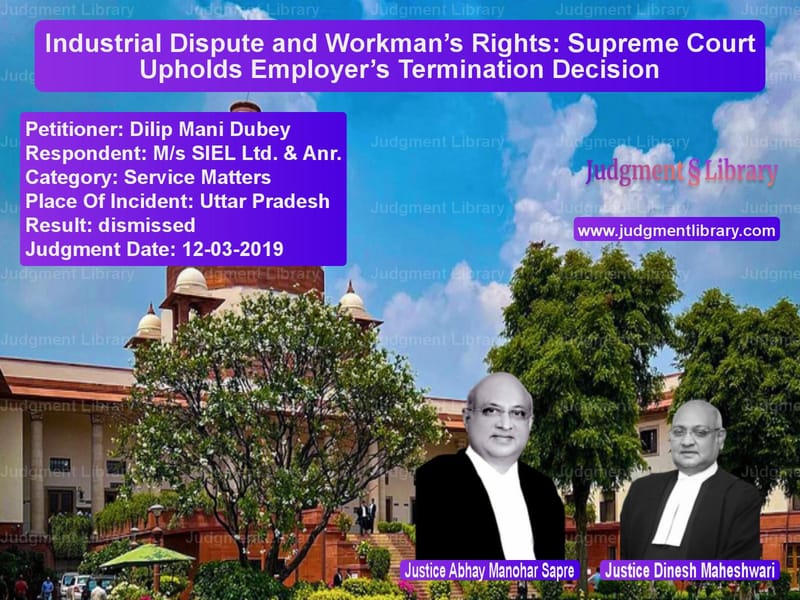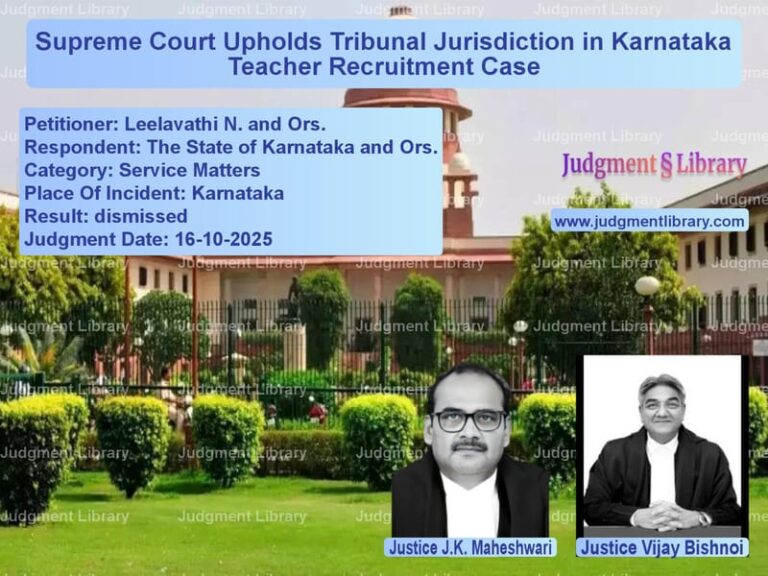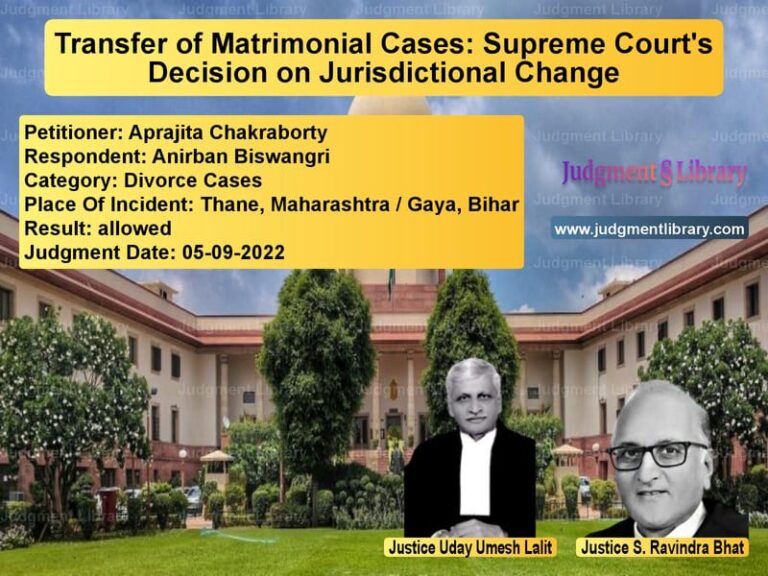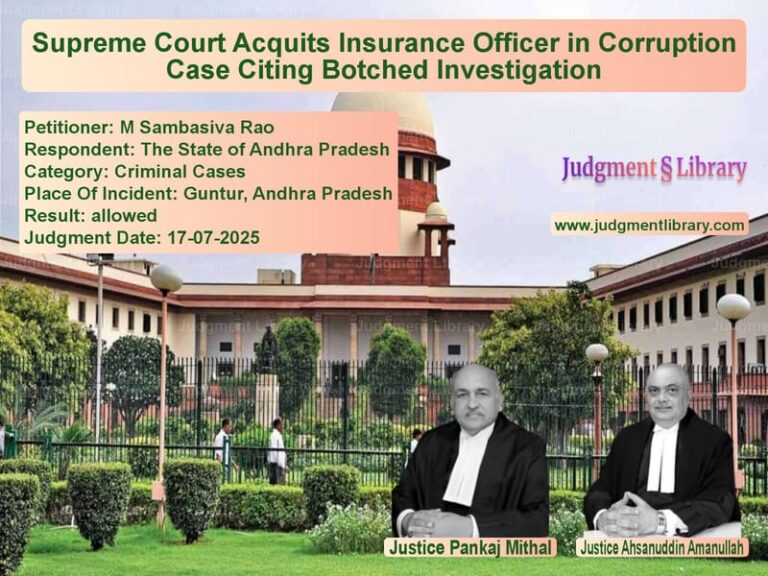Industrial Dispute and Workman’s Rights: Supreme Court Upholds Employer’s Termination Decision
The case of Dilip Mani Dubey v. M/s SIEL Ltd. & Anr. is an important judgment concerning labor laws, workman’s rights, and industrial disputes in India. The Supreme Court, in its judgment dated March 12, 2019, dealt with the issue of whether an employee’s termination was valid under the Industrial Disputes Act, 1947. The ruling reaffirmed the principle that the legality of termination must be assessed based on the workman’s continuous service, as defined under the relevant laws.
The dispute arose when the employer, M/s SIEL Ltd., terminated the services of the appellant, Dilip Mani Dubey. The Industrial Tribunal had ruled in favor of the workman, ordering reinstatement with back wages. However, the Allahabad High Court set aside this ruling, finding that the appellant had not completed one year of continuous service as required under Section 6-N of the U.P. Industrial Disputes Act. The Supreme Court upheld the High Court’s decision, confirming that the employer had lawfully terminated the services.
Case Background
The appellant, Dilip Mani Dubey, was employed at M/s SIEL Ltd. His services were terminated, leading him to challenge the termination before the Industrial Tribunal, Meerut. The Tribunal ruled in his favor, directing his reinstatement with back wages.
The employer, M/s SIEL Ltd., challenged this ruling before the Allahabad High Court through a writ petition. The High Court, by order dated November 29, 2007, set aside the Tribunal’s ruling and upheld the termination. A review petition filed by the workman was also dismissed on February 5, 2008.
Aggrieved by these decisions, the workman approached the Supreme Court.
Petitioner’s Arguments
The appellant, represented by Advocate Devvrat, contended that:
- The Industrial Tribunal’s decision was legally sound and should not have been interfered with by the High Court.
- He had completed one year of continuous service, making his termination illegal under Section 6-N of the U.P. Industrial Disputes Act.
- The High Court exceeded its jurisdiction by re-examining the evidence and setting aside a factual finding.
- As per the ruling in Sriram Industrial Enterprises Ltd. v. Mahak Singh & Ors., the termination should have been declared void.
Respondent’s Arguments
The employer, represented by Senior Advocate Debal Banerji and Advocate Shrish Kumar Misra, argued:
- The workman had not completed one year of continuous service, as required under the Industrial Disputes Act.
- The High Court correctly exercised its jurisdiction by overturning the Tribunal’s award.
- The Tribunal’s finding was erroneous, as it ignored evidence proving the workman’s incomplete service period.
- The legal precedent in Sriram Industrial Enterprises Ltd. was not applicable to this case due to factual differences.
Supreme Court’s Observations and Ruling
The Supreme Court, after reviewing the case records, upheld the High Court’s decision. It held that:
“The High Court examined the matter in detail and rightly came to the conclusion that the appellant (workman) did not work continuously for one year with the respondent (employer).”
The Court emphasized that it does not re-examine factual findings unless they are perverse or unsupported by evidence. It stated:
“A finding on such a question being a finding of fact, this Court cannot examine such a question de novo by appreciating the whole evidence adduced by the parties again in these appeals.”
Regarding the jurisdiction of the High Court, the Supreme Court clarified:
“The High Court rightly traveled through the factual matrix to examine the issue in its proper perspective and correctly reversed the Industrial Tribunal’s finding.”
The Supreme Court also addressed the appellant’s reliance on Sriram Industrial Enterprises Ltd., ruling that:
“The precedent cited by the appellant is distinguishable on facts and is not applicable to the present case.”
The Court further noted that despite losing the case, the workman had received substantial payments under Section 17-B of the Industrial Disputes Act during litigation. It ruled that:
“Whatever amount already paid to the appellant in compliance with the Section 17-B order shall not be recoverable by the employer.”
Conclusion
This judgment reinforces the legal principles governing industrial disputes, particularly regarding continuous service requirements and judicial interference in factual findings. The key takeaways include:
- A workman must complete one year of continuous service to claim protection under Section 6-N of the U.P. Industrial Disputes Act.
- High Courts can set aside Industrial Tribunal decisions if they are based on erroneous factual findings.
- Supreme Court does not re-examine factual issues unless there is a clear error or legal misinterpretation.
- Payments made under Section 17-B of the Industrial Disputes Act during litigation are not recoverable, even if the workman ultimately loses the case.
By upholding the employer’s decision and rejecting the workman’s plea, the Supreme Court reaffirmed the necessity of proving continuous service in labor disputes and clarified the limits of judicial review in such matters.
Petitioner Name: Dilip Mani Dubey.Respondent Name: M/s SIEL Ltd. & Anr..Judgment By: Justice Abhay Manohar Sapre, Justice Dinesh Maheshwari.Place Of Incident: Uttar Pradesh.Judgment Date: 12-03-2019.
Don’t miss out on the full details! Download the complete judgment in PDF format below and gain valuable insights instantly!
Download Judgment: Dilip Mani Dubey vs Ms SIEL Ltd. & Anr. Supreme Court of India Judgment Dated 12-03-2019.pdf
Direct Downlaod Judgment: Direct downlaod this Judgment
See all petitions in Employment Disputes
See all petitions in Termination Cases
See all petitions in Public Sector Employees
See all petitions in Recruitment Policies
See all petitions in Judgment by Abhay Manohar Sapre
See all petitions in Judgment by Dinesh Maheshwari
See all petitions in dismissed
See all petitions in supreme court of India judgments March 2019
See all petitions in 2019 judgments
See all posts in Service Matters Category
See all allowed petitions in Service Matters Category
See all Dismissed petitions in Service Matters Category
See all partially allowed petitions in Service Matters Category







